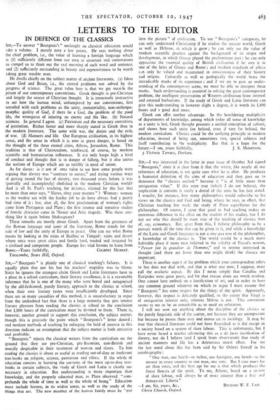reformers of education, is not quite sure what he is
after. He produces a humanist definition of the aims of education and then goes on to denounce the "classics outlook" because it "is of little more than antiquarian value." If this were true (which I do not believe), the implication it contains is surely a denial of the aims he has just stated. I wonder, for instance, how many philosophers would subscribe to his views on the classics and God and being, where he says, in effect, that Christian teaching has made the study of Plato superfluous for the philosopher. Of course, I agree that good or bad teaching makes an enormous difference to the effect on the student of his studies, but I do not see why this should be more true of the teaching of classics than of, say, economics. But, apart from this, I believe philosophy to be a pursuit worth all the time that can be given to it, and while a knowledge of the Latin and Greek languages is not a sine qua non of the philosopher, a knowledge of the classics is. The world would be a much more habitable place if more men believed in the validity of Pascal's maxim, " Penser fait Is grandeur de Phomme," and to anyone interested in thought (and there are fewer than one might think) the classics are important.
There is another aspe:r of the problem which your correspondent refers to but does not deal with, and that is what one now, I suppose, must call the aesthetic aspect. By this I mean simply that Catullus and Euripides were great poets, and for that reason alone are worth reading. One cannot here embark on a justification of art, and in order to have any common ground whatever on which to argue I must assume that "Bourgeois" has some respect for the things of the spirit. Apparently, however, this respect is delicately qualified, to the extent that Virgil is of antiquarian interest only, whereas Milton is not. This contention seems to me to be so remarkable as to need no refutation.
I will not now say anything about the discipline of the classics or the purely linguistic side of the matter, not because they are unimportant but because he passes them over and moves on to sociology. It may be true that classical literature could not have flourished as it did except in a society based on a system of slave labour. This is unfortunate, but I
have never heard a teacher advancing this as a de facto justification of slavery, nor do I believe (and I speak from observation) that study of ancient manners and life has a deleterious moral effect. For me the last word about this has been said by Sir Osbert Sitwell in his autobiography: "One man, one borr b—or rather, one foreigner, one bomb—is the answer in every country to one man, one vote_ But I care more for
art than votes, and the best age for me is that which produces the finest flowers of the spirit. To me, Athens, based on a system of slave labour, will always be of more interest than a free and democratic Liberia."


































 Previous page
Previous page